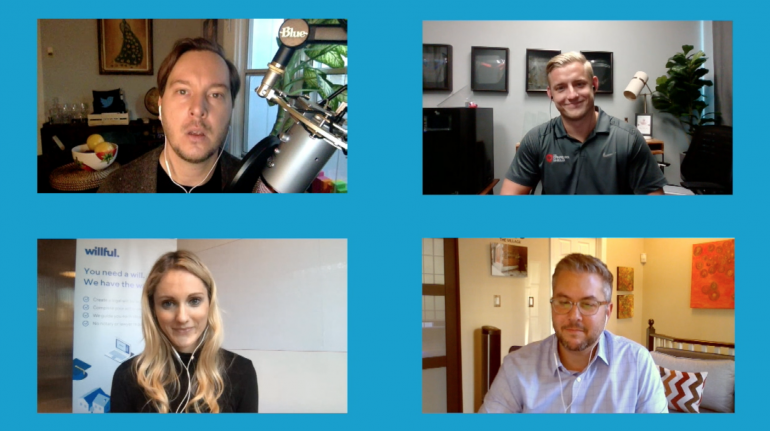Only 28 percent of Canadian small businesses have been able to maintain or exceed normal revenues during the COVID-19 pandemic. That’s a problem when you consider Canadian small businesses employ over 8.4 million people, or 70 percent of Canada’s private labour force. As the initial shockwaves from the pandemic subside, thousands of small businesses employing millions of people are looking to recover and rebuild.
In a recently streamed BetaKit Live, Cisco Canada Director of Innovation, Wayne Cuervo, joined Erin Bury, CEO of Willful, and Jeremy Hedges, founder of The Canadian Shield, in a conversation on how small businesses could both survive and thrive post-pandemic. Each provided a different perspective on how entrepreneurs could stay flexible, take advantage of new opportunities, and lead with empathy.
Embracing flexibility
When the pandemic hit, legal tech startup Willful was in an interesting position. Like many companies, it didn’t know how the pandemic would affect business. Still, CEO Erin Bury made a tough call early on: she turned off all marketing.
“It seemed a bit tone-deaf,” said Bury, talking about Willful’s upbeat and humour-focused marketing strategy during a pandemic causing anxiety, fear, and loss.
“Businesses that have had a digital-first capability are the most resilient.”
– Wayne Cuervo
However, the pandemic also made end of life, wills, and estate planning very prominent in people’s minds, which Bury said opened the floodgates to 101-level questions about each. In response, Bury focused all her marketing efforts on genuine Q&A-style educational content on Twitter and Instagram. She also tried TikTok, as the platform was surging in use during the early days of the pandemic, giving Willful a leg up on competitors – i.e., traditional lawyers – who were slower to adopt digital channels.
Hedges, on the other hand, demonstrated flexible leadership in a completely different way. His company InkSmith uses 3D and laser printing to help schools add tech to their classrooms. When COVID hit, Hedges took InkSmith’s 3D printers and used them to develop personal protective equipment (PPE) for the company’s hometown of Waterloo.
“It was less a well-thought-out decision than wanting to help Waterloo region,” said Hedges. “A couple days later, Ontario Health called us.”
As demand for PPE surged – and shortages loomed – Hedges took the manufacturing capability of InkSmith and spun-out a separate company, The Canadian Shield. Hedges said that that demand for PPE led the company to increase its manufacturing capacity by 10 times, receiving orders for over 16 million face shields as Canada sought to become PPE manufacturing independent during the crisis.

Building business resilience
Responding to Bury and Hedges’ stories, Cuervo spoke about the ongoing shift to remote work and how the pandemic laid bare the need for business continuity and resiliency plans that involve not just entrepreneurial creativity, but technology.
“Businesses that have had a digital-first capability are the most resilient,” said Cuervo.
According to Cuervo, there are three key elements to business continuity and resiliency plans: access to customers through new channels if current channels no longer work, ensuring employees can safely deliver their work from anywhere, and that their work output is secure despite the unlimited number of connections and physical locations employees can now work from.
Developing that resilience, Cuervo said, requires prioritizing both revenue-generating activities and the important things like professional development and cybersecurity that too easily get pushed down the list.
Leading with empathy
Crisis management requires more than flexibility and creativity, however. Startup leaders also have to guide their teams through difficult times with empathy.
Hedges saw this need firsthand with his team. While running both The Canadian Shield and InkSmith, Hedges was working 14-16 hour days and quickly burning himself out. But more troubling was that his actions sent cues to his teams that they had to work long days as well, so his entire staff was well on its way to burnout. To combat this, Hedges said he immediately began to prioritize his mental and physical health. His team took those cues as well, using Hedges’ example as permission to focus on self-care.
“When you’re the founder, you might drag people along at a pace they can’t manage,” he said, adding “I did it first, then other people realized it was OK.”
Empathetic leadership can also be focused on your customers, a lesson Bury learned when the pandemic all but shut down in-person gatherings. Despite pandemic social distancing, wills still need to be signed in-person and with a physical copy. So while more people than ever were looking to make end of life plans, many people who either lived alone or were without access to a printer were stuck.
The Willful team thought about how to solve this problem for its customers, and came up with a simple solution. During the early days of the pandemic, Willful would print and mail a physical copy of your will if you lost access to a printer. Bury herself is also working to get certified as an official witness so she can co-sign wills for customers, meaning Willful can better serve people who live alone or are forced into isolation during the pandemic. In the end, Bury said Willful printed and shipped over 400 wills for customers that otherwise would have been invalid due to pandemic restrictions.
To hear more from Willful, Cisco, and the Canadian Shield, watch the full BetaKit Live conversation below.


